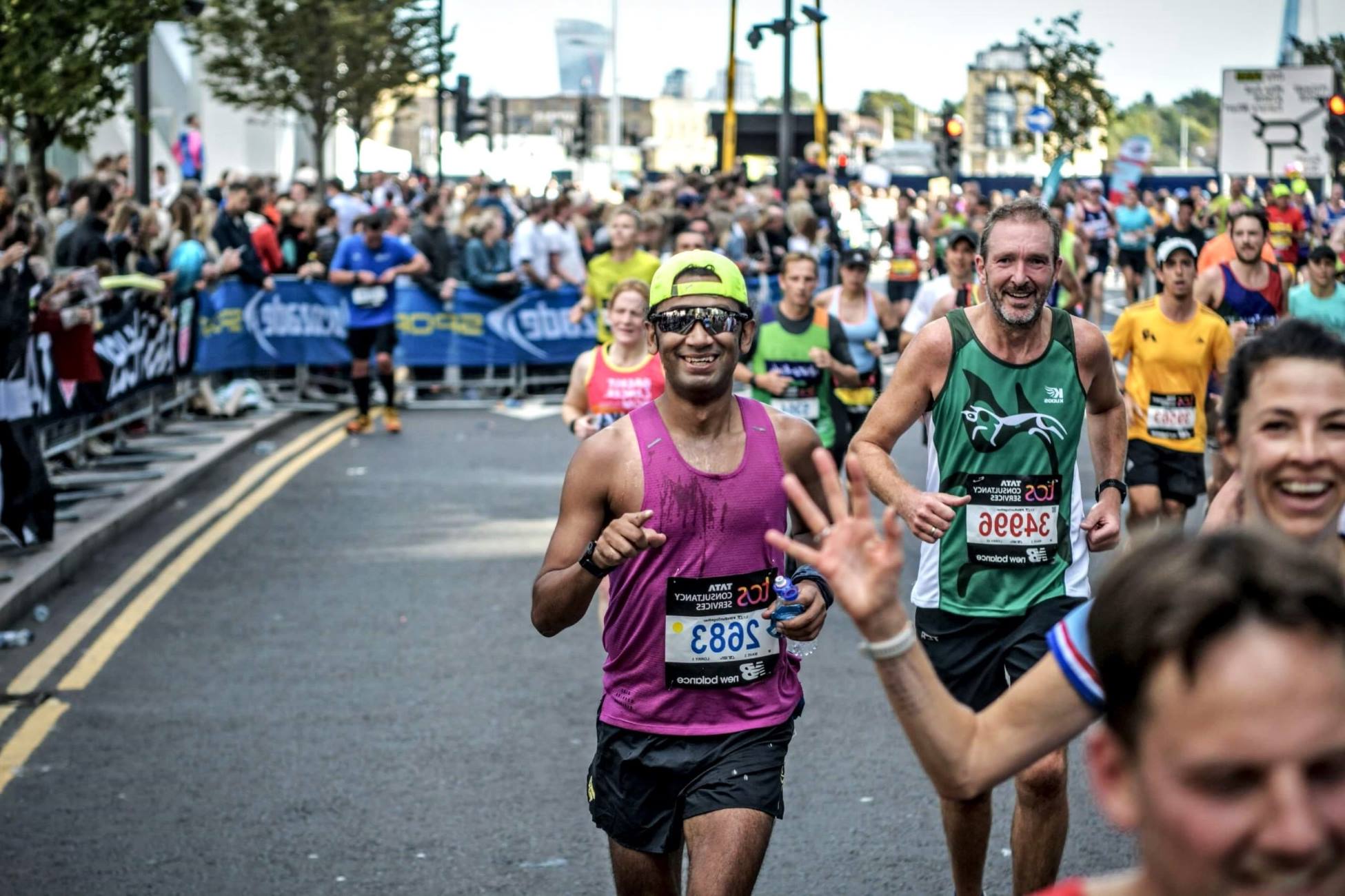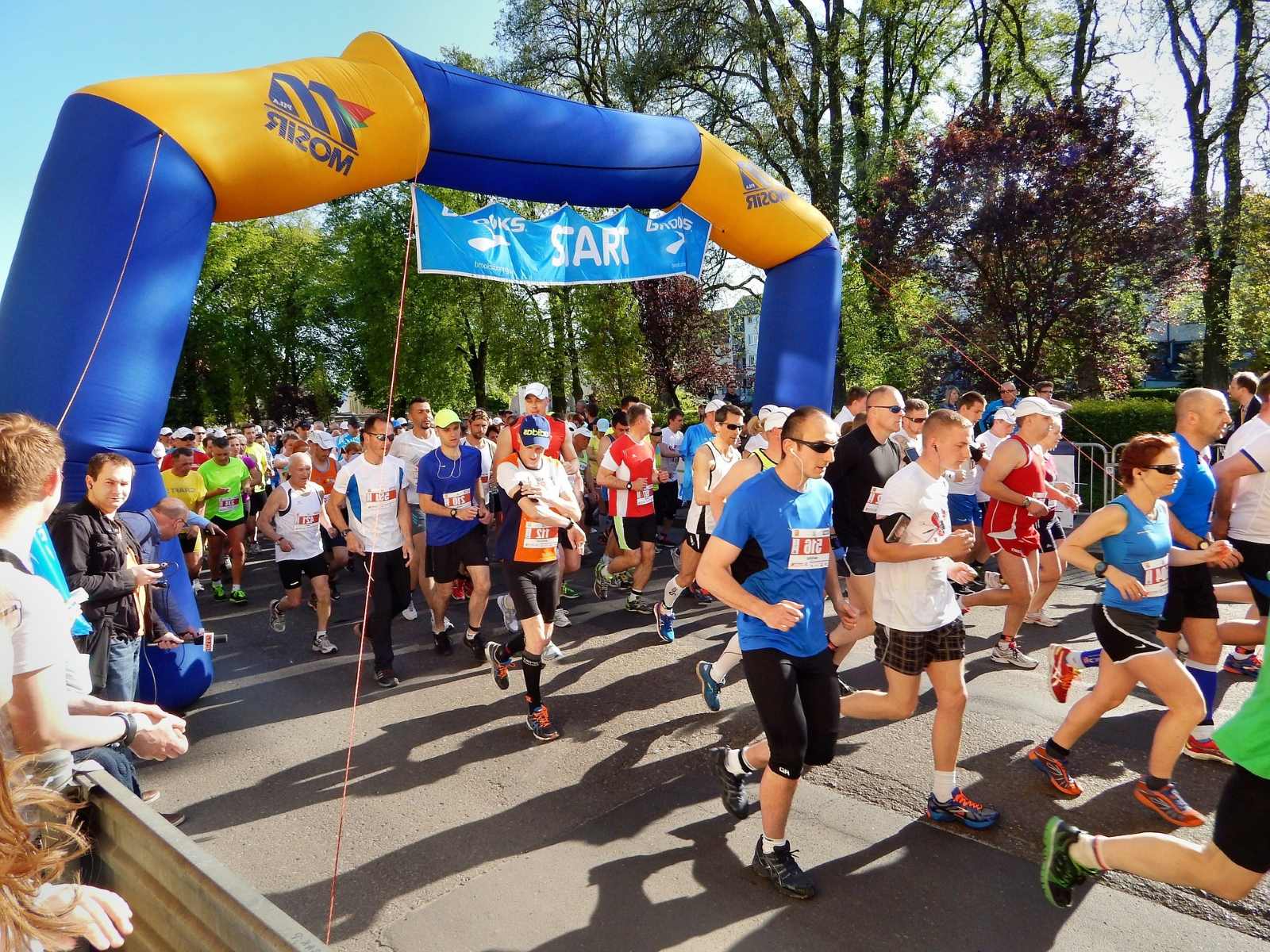Home>Training & Techniques>Training Plans>Achieving A Sub-4.5 Hour Finish Time: The Mission Marathon Training Plan


Training Plans
Achieving A Sub-4.5 Hour Finish Time: The Mission Marathon Training Plan
Published: February 28, 2024
Get ready to conquer your marathon goal with our Mission Marathon Training Plan. Achieve a sub-4.5 hour finish time with our expertly crafted training plans. Start your journey today!
(Many of the links in this article redirect to a specific reviewed product. Your purchase of these products through affiliate links helps to generate commission for Therunningadvisor.com, at no extra cost. Learn more)
Table of Contents
Introduction
Embarking on the journey to conquer a marathon is a monumental undertaking that requires dedication, perseverance, and a well-structured training plan. For many runners, the ultimate goal is to achieve a sub-4.5 hour finish time, a feat that demands strategic preparation and unwavering commitment. In this comprehensive guide, we will delve into the intricacies of the Mission Marathon Training Plan, designed to equip runners with the physical and mental fortitude necessary to cross the finish line within the coveted time frame.
The Mission Marathon Training Plan is tailored for individuals who aspire to complete a marathon in under 4.5 hours, encompassing a meticulously crafted regimen that encompasses various facets of training, including building endurance, enhancing speed, and honing mental resilience. This training plan is not merely a series of workouts; it is a roadmap that guides runners through a transformative journey, culminating in the triumphant achievement of their marathon goal.
As we navigate through the different phases of the Mission Marathon Training Plan, we will unravel the key components that contribute to its effectiveness, providing invaluable insights into the progressive nature of the program. From laying the foundation of endurance in the initial weeks to fine-tuning speed and strength in the later stages, each phase is strategically designed to optimize performance and minimize the risk of injury.
Whether you are a seasoned marathoner or a novice embarking on your first 26.2-mile odyssey, the Mission Marathon Training Plan serves as a beacon of guidance, empowering you to push beyond your limits and emerge victorious on race day. By immersing yourself in this comprehensive training regimen, you will not only elevate your physical capabilities but also cultivate the mental resilience required to surmount the challenges that await you on the marathon course.
Join us as we unravel the intricacies of the Mission Marathon Training Plan, delving into the nuances of each phase and equipping you with the knowledge and motivation to pursue your sub-4.5 hour marathon goal with unwavering determination. This journey is not merely about crossing the finish line; it is about embracing the relentless pursuit of excellence and discovering the depths of your own potential as a runner.
Setting Your Sub-4.5 Hour Finish Time Goal
Setting a sub-4.5 hour finish time goal for a marathon is a pivotal step that demands careful consideration and unwavering commitment. This ambitious target serves as a driving force, igniting the flames of determination and propelling runners towards a transformative journey of physical and mental fortitude.
The decision to pursue a sub-4.5 hour finish time is not merely about crossing the finish line within a specific timeframe; it is a testament to the relentless pursuit of excellence and the unwavering dedication to surpass personal boundaries. Aspiring to achieve this goal requires a deep-seated belief in one's capabilities and a steadfast resolve to endure the challenges that lie ahead.
When setting the sub-4.5 hour finish time goal, it is imperative to approach it with a blend of optimism and realism. While it represents a formidable challenge, it is also an attainable objective for runners who are willing to invest the time and effort into their training. This goal serves as a beacon of motivation, inspiring individuals to push beyond their comfort zones and embrace the discomfort that accompanies rigorous training.
Furthermore, establishing the sub-4.5 hour finish time goal necessitates a comprehensive understanding of one's current fitness level and running capabilities. This introspective assessment provides a foundation for crafting a personalized training plan that aligns with the specific needs and aspirations of the individual runner. By acknowledging one's strengths and identifying areas for improvement, runners can tailor their approach to training, thereby maximizing their potential for success.
Moreover, the sub-4.5 hour finish time goal serves as a catalyst for holistic growth, transcending the realms of physical fitness and permeating into the domain of mental resilience. It fosters a mindset of unwavering determination, instilling the belief that obstacles are merely stepping stones towards the ultimate triumph. This mental fortitude is a cornerstone of marathon training, empowering runners to navigate through the grueling demands of long-distance running with unwavering resolve.
In essence, setting a sub-4.5 hour finish time goal is a transformative declaration that transcends the confines of a mere numerical target. It embodies the spirit of unwavering determination, resilience, and the unyielding pursuit of personal excellence. By embracing this goal wholeheartedly, runners embark on a profound journey of self-discovery, unraveling the depths of their potential and emerging as victors in the pursuit of their marathon aspirations.
Understanding the Mission Marathon Training Plan
The Mission Marathon Training Plan is a meticulously crafted regimen designed to equip runners with the physical and mental fortitude necessary to achieve a sub-4.5 hour finish time in a marathon. This comprehensive training plan is not merely a series of workouts; it is a transformative journey that encompasses various facets of training, including building endurance, enhancing speed, and honing mental resilience.
At its core, the Mission Marathon Training Plan is founded on the principles of progressive overload and periodization. It is structured to gradually increase the intensity and volume of training over specific phases, allowing runners to adapt and grow stronger while minimizing the risk of overtraining and injury. This strategic approach ensures that runners are primed for peak performance on race day, having undergone a systematic and purposeful training regimen.
The training plan is characterized by its multidimensional focus, addressing not only the physical demands of marathon running but also the mental and emotional aspects of long-distance racing. It incorporates long runs to build endurance, speed workouts to enhance cardiovascular capacity, strength training to fortify muscles, and recovery sessions to facilitate optimal healing and adaptation. Additionally, the plan integrates mental resilience training, emphasizing the importance of mental fortitude in overcoming the inevitable challenges encountered during marathon preparation and racing.
Furthermore, the Mission Marathon Training Plan is adaptable, catering to runners of varying experience levels and abilities. It acknowledges the individuality of each runner, allowing for customization and flexibility within the framework of the training regimen. Whether a seasoned marathoner or a first-time participant, the plan can be tailored to suit the specific needs and goals of the individual, fostering a sense of inclusivity and accessibility.
In essence, the Mission Marathon Training Plan transcends the conventional notion of a training schedule; it embodies a holistic approach to marathon preparation, encompassing physical, mental, and emotional facets of the runner's journey. By understanding the intricacies of this comprehensive training plan, runners are poised to embark on a transformative odyssey, equipped with the tools and knowledge necessary to pursue their sub-4.5 hour marathon goal with unwavering determination and confidence.
Building Your Base: Weeks 1-4
The initial phase of the Mission Marathon Training Plan, spanning Weeks 1-4, is dedicated to building a solid foundation of endurance and establishing a framework for the rigorous training that lies ahead. This phase serves as the bedrock upon which the subsequent weeks of training will be built, emphasizing the gradual progression of mileage and the cultivation of physical resilience.
During Weeks 1-4, the focus is on establishing a consistent running routine, gradually increasing the weekly mileage to acclimate the body to the demands of long-distance running. The primary objective is not speed or intensity but rather the development of aerobic capacity and muscular endurance. This phase often involves a mix of easy-paced runs, cross-training activities, and strength exercises to fortify the muscles and connective tissues.
Long runs, albeit at a moderate pace, form the cornerstone of this phase, gradually extending in duration to bolster cardiovascular endurance and mental fortitude. These long runs lay the groundwork for the physiological adaptations essential for sustained performance over the marathon distance. Additionally, incorporating cross-training activities such as cycling or swimming provides a well-rounded approach to cardiovascular conditioning while mitigating the risk of overuse injuries.
Furthermore, Weeks 1-4 serve as an opportunity for runners to acclimate to the rigors of consistent training, fostering discipline and mental resilience. Establishing a routine and adhering to the prescribed training schedule instills a sense of commitment and dedication, laying the groundwork for the arduous yet rewarding journey that lies ahead.
In essence, the initial phase of the Mission Marathon Training Plan is characterized by deliberate progression, emphasizing the gradual buildup of mileage, the cultivation of endurance, and the establishment of a disciplined training routine. By dedicating focused attention to building a robust base in the early weeks of training, runners set the stage for the subsequent phases, poised to elevate their performance and pursue their sub-4.5 hour marathon goal with unwavering determination and confidence.
Increasing Endurance: Weeks 5-8
As runners progress into Weeks 5-8 of the Mission Marathon Training Plan, the focus shifts towards intensifying endurance and fortifying the physiological and mental resilience necessary for sustained long-distance performance. This phase represents a pivotal juncture in the training regimen, where the cumulative effects of consistent training begin to manifest in enhanced aerobic capacity and muscular endurance.
During this phase, the training plan strategically incorporates longer long runs, gradually extending the duration to challenge the body's limits and stimulate adaptations conducive to marathon performance. These extended long runs serve as a crucible for mental fortitude, requiring runners to navigate through prolonged periods of physical exertion while honing their ability to sustain a steady pace and maintain focus.
In addition to the elongated long runs, Weeks 5-8 integrate tempo runs and interval training sessions to enhance cardiovascular efficiency and bolster lactate threshold. Tempo runs, characterized by sustained efforts at a comfortably hard pace, facilitate the development of race-specific fitness, enabling runners to acclimate to the physical demands of marathon pace. Likewise, interval training sessions, featuring structured bouts of high-intensity running interspersed with recovery intervals, serve to elevate anaerobic capacity and overall speed, contributing to a well-rounded approach to endurance enhancement.
Furthermore, strength training assumes heightened significance during this phase, targeting muscular imbalances and fortifying the musculoskeletal system to withstand the rigors of prolonged running. Incorporating targeted strength exercises and functional movements not only mitigates the risk of injury but also fosters a foundation of structural resilience essential for enduring the demands of marathon training and racing.
Moreover, Weeks 5-8 emphasize the importance of recovery and adaptation, underscoring the need for adequate rest and rejuvenation to optimize training adaptations. Active recovery days and cross-training activities are integrated strategically to facilitate physical and mental recuperation, ensuring that runners are primed for subsequent training sessions and long runs.
In essence, the phase of increasing endurance in Weeks 5-8 embodies a comprehensive approach to fortifying the physical and mental attributes essential for marathon success. By immersing themselves in the rigors of extended long runs, tempo efforts, interval training, and targeted strength exercises, runners cultivate the resilience and fortitude necessary to pursue their sub-4.5 hour marathon goal with unwavering determination and confidence.
Speed and Strength: Weeks 9-12
As runners transition into Weeks 9-12 of the Mission Marathon Training Plan, the focus pivots towards the refinement of speed, the enhancement of strength, and the integration of race-specific simulations. This phase represents a critical juncture in the training regimen, where the culmination of endurance development converges with targeted efforts to optimize speed and fortify the musculoskeletal system for the demands of marathon racing.
The training plan strategically incorporates speed workouts designed to elevate anaerobic capacity, enhance running economy, and cultivate the ability to sustain race pace over extended durations. Interval training assumes prominence, featuring structured repetitions of high-intensity running interspersed with brief recovery intervals. These intervals serve as a catalyst for physiological adaptations, fostering improved neuromuscular coordination, heightened cardiovascular efficiency, and the ability to withstand the rigors of sustained speed.
Moreover, tempo runs continue to feature prominently in this phase, enabling runners to acclimate to the discomfort of sustained race pace while fortifying mental resilience. These sustained efforts at race pace not only refine speed and endurance but also instill the mental fortitude necessary to confront the challenges of marathon racing with unwavering determination.
In parallel, strength training assumes heightened significance, emphasizing targeted exercises to fortify the musculoskeletal system and mitigate the risk of injury. The integration of resistance training, plyometric exercises, and functional movements serves to bolster muscular strength, enhance running economy, and cultivate a foundation of structural resilience essential for enduring the demands of marathon racing.
Furthermore, Weeks 9-12 incorporate race-specific simulations, allowing runners to practice pacing strategies, nutrition protocols, and mental resilience in a controlled yet challenging environment. Long runs with segments at goal marathon pace provide a platform for runners to internalize race pace, refine fueling strategies, and fortify their mental resolve in preparation for the demands of race day.
Additionally, recovery and rejuvenation remain integral components of this phase, underscoring the need for adequate rest, nutrition, and self-care practices to optimize training adaptations and facilitate physical and mental recuperation. Active recovery days, cross-training activities, and targeted mobility work serve to mitigate the cumulative effects of training while priming runners for the subsequent phases of the training plan.
In essence, the phase of speed and strength in Weeks 9-12 embodies a comprehensive approach to refining speed, enhancing strength, and integrating race-specific simulations, equipping runners with the physical and mental fortitude necessary to pursue their sub-4.5 hour marathon goal with unwavering determination and confidence.
Tapering and Final Preparations: Weeks 13-16
As runners approach Weeks 13-16 of the Mission Marathon Training Plan, the focus shifts towards tapering and final preparations, marking the culmination of rigorous training and the transition into a phase of strategic rest and readiness. This pivotal stage represents the tapering period, where the cumulative effects of training are harnessed and channeled towards optimizing physical readiness, mental acuity, and race day preparedness.
Tapering is a deliberate reduction in training volume and intensity, designed to facilitate recovery, minimize accumulated fatigue, and maximize the body's adaptive responses to training. During this phase, the training plan strategically integrates a gradual reduction in mileage and intensity, allowing the body to recuperate while maintaining the gains in aerobic capacity and muscular endurance acquired during the preceding weeks.
The tapering phase serves as a period of rejuvenation, enabling runners to shed residual fatigue and approach race day with a sense of vitality and readiness. It is characterized by a reduction in long run duration, a decrease in the frequency of speed workouts, and an emphasis on maintaining the rhythm of training while allowing for ample recovery. This strategic reduction in training load fosters a supercompensation effect, wherein the body rebounds from accumulated fatigue, resulting in heightened readiness and performance potential.
Moreover, Weeks 13-16 emphasize the importance of mental preparation and race day logistics. Runners are encouraged to visualize race day scenarios, rehearse pacing strategies, and fine-tune nutrition and hydration protocols. Mental resilience training assumes heightened significance, empowering runners to cultivate a mindset of confidence, focus, and adaptability in anticipation of the challenges that await them on race day.
Additionally, the tapering phase provides an opportunity for runners to address any lingering aches, pains, or niggles through targeted mobility work, self-myofascial release, and gentle stretching. This proactive approach to injury prevention and management ensures that runners arrive at the start line in optimal physical condition, poised to tackle the marathon distance with resilience and determination.
In essence, the tapering and final preparations phase in Weeks 13-16 embodies a strategic approach to rest, recovery, and readiness, equipping runners with the physical and mental fortitude necessary to pursue their sub-4.5 hour marathon goal with unwavering determination and confidence. By embracing this phase with intention and mindfulness, runners set the stage for a triumphant and fulfilling race day experience.
Race Day Strategies for Success
Race day represents the culmination of months of dedicated training, unwavering commitment, and the relentless pursuit of a sub-4.5 hour marathon finish. As runners stand poised at the start line, the amalgamation of physical preparedness and mental fortitude converges, setting the stage for a transformative and triumphant journey. To optimize performance and navigate the challenges of marathon racing, strategic race day strategies are paramount.
Pacing Precision
Central to race day success is the art of pacing, a delicate balance between ambition and restraint. For runners aiming to achieve a sub-4.5 hour finish, a disciplined approach to pacing is imperative. Commencing the race at a sustainable pace, slightly below target marathon pace, allows for a gradual acclimation to the demands of the distance, conserving precious energy for the latter stages of the race. Adhering to a well-calibrated pacing strategy, informed by diligent training and race simulations, mitigates the risk of premature fatigue and sets the stage for a strong finish.
Nutrition and Hydration
The orchestration of nutrition and hydration protocols on race day is a linchpin of success. Ensuring adequate pre-race fueling, with a focus on easily digestible carbohydrates, primes the body for sustained performance. During the race, strategic fueling at regular intervals, complemented by hydration stations, replenishes glycogen stores and mitigates the risk of dehydration. Balancing the intake of energy gels, electrolyte drinks, and water aligns with the demands of the marathon distance, sustaining energy levels and optimizing physiological function.
Mental Resilience
The marathon journey is as much a test of mental fortitude as it is of physical prowess. Cultivating a resilient mindset, characterized by adaptability, focus, and unwavering determination, is instrumental on race day. Embracing the inevitable ebbs and flows of the marathon with equanimity, leveraging positive affirmations and visualization techniques, and breaking the race into manageable segments fortifies mental resilience. Moreover, drawing strength from the collective energy of fellow runners and the resounding support of spectators fosters a sense of camaraderie and motivation.
Adaptability and Grit
Amidst the tapestry of race day, adaptability and grit emerge as defining attributes. Navigating unforeseen challenges, such as inclement weather or unexpected physical discomfort, demands a spirit of adaptability and resilience. Embracing the ebb and flow of the race with tenacity, making real-time adjustments to pacing and strategy, and summoning reserves of grit in the face of adversity epitomize the indomitable spirit of marathon racing.
Triumph in the Finish
As the finish line beckons, the crescendo of months of preparation reaches its zenith. Summoning the reserves of strength and determination cultivated throughout the training journey, runners surge towards the finish, propelled by the unwavering pursuit of their sub-4.5 hour marathon goal. Crossing the finish line represents not only the fulfillment of a numerical target but the embodiment of resilience, perseverance, and the relentless pursuit of personal excellence.
In essence, race day strategies for success encapsulate a harmonious interplay of physical preparedness, mental fortitude, and strategic acumen. By embracing pacing precision, optimizing nutrition and hydration, fortifying mental resilience, embodying adaptability and grit, and triumphing in the finish, runners are poised to transcend their sub-4.5 hour marathon goal with unwavering determination and triumphant success.














